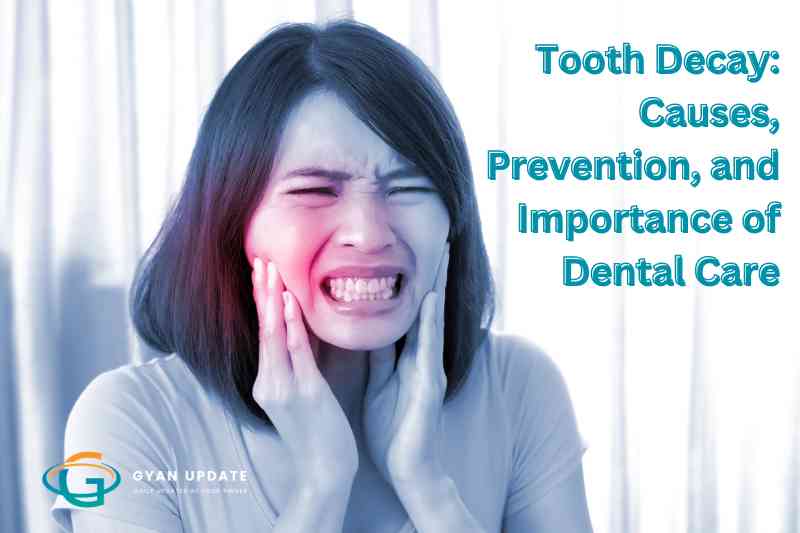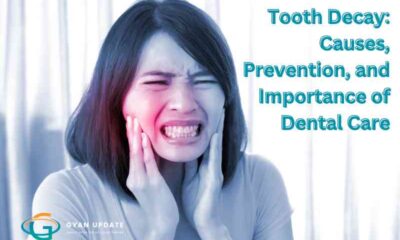Health
Understanding Tooth Decay: Causes, Prevention, and Importance of Dental Care
As parents or guardians, it’s essential to instill good oral hygiene practices in children from a young age. Teaching them how to brush and floss properly, and ensuring they visit the dentist regularly can go a long way in preventing tooth decay.

Share this
Teeth are essential for our everyday activities like smiling and eating. They play a crucial role in our overall health. However, sometimes they can face issues, leading to problems like decay or cavities. Let’s delve into the world of dental health to understand why teeth deteriorate prematurely and what we can do to prevent it.
Why Do Teeth Decay?
To understand why teeth decay, we need to first grasp the basics of dental hygiene. Just like we clean our bodies daily, our teeth need regular cleaning too. If we don’t clean our teeth properly, food particles can get stuck between them. Over time, these food particles can turn into harmful bacteria, leading to tooth decay.
One of the main reasons for tooth decay is improper cleaning of teeth. If we don’t brush our teeth regularly or clean them properly after meals, these bacteria can thrive, causing damage to our teeth. This is especially true for children, whose dental care is often overlooked. As they grow, this neglect can lead to severe dental issues.
Prevention Is Key
The good news is that tooth decay can be prevented with proper dental care. Here are some simple steps we can take to keep our teeth healthy:
- Brushing Twice a Day: It’s essential to brush our teeth at least twice a day, preferably after meals. This helps remove food particles and bacteria, keeping our teeth clean and healthy.
- Using the Right Toothpaste: Choosing the right toothpaste can make a difference. Look for fluoride toothpaste, as fluoride helps strengthen tooth enamel and prevents decay.
- Flossing Regularly: Along with brushing, flossing is crucial for removing food particles stuck between teeth. Flossing at least once a day can significantly reduce the risk of tooth decay.
- Visiting the Dentist: Regular dental check-ups are vital for maintaining oral health. Dentists can spot early signs of decay and provide timely treatment, preventing further damage to the teeth.
- Avoiding Sugary Foods: Sugary foods and drinks can contribute to tooth decay. Limiting our intake of sugary snacks and beverages can help protect our teeth from decay.
The Importance of Dental Care for Children
Children are particularly vulnerable to tooth decay due to their developing dental hygiene habits. As parents or guardians, it’s essential to instill good oral hygiene practices in children from a young age. Teaching them how to brush and floss properly, and ensuring they visit the dentist regularly can go a long way in preventing tooth decay.
Seeking Professional Help
If you or your child experience any dental issues, it’s crucial to seek professional help. Dentists are trained to diagnose and treat dental problems effectively. Avoid using home remedies for dental issues, as they may not provide the necessary treatment and could even worsen the condition.
Tooth decay is a common dental issue that can be prevented with proper care and hygiene. By following simple steps like brushing regularly, flossing, and visiting the dentist, we can maintain our oral health and prevent tooth decay. It’s essential to start practicing good dental hygiene habits from a young age and seek professional help when needed. Remember, a healthy smile starts with healthy teeth!
Share this
Blog
Hoe Does Masturbation affect your Life ?
Masturbation is a normal, healthy part of life and has no negative impact on relationships or sexual health. It can enhance well-being and communication with a partner. As long as it is in moderation and doesn’t harm intimacy, there’s no need for guilt or anxiety.

Does masturbation affect your sex life? Myths vs. Reality
Masturbation is a perfectly normal human activity, but there are many myths about how it affects sexual relationships. Some people say it ruins their sex life while others say it does them no harm. What is the real truth?
Myth #1: Masturbation reduces sexual desire
Many people think that frequent masturbation reduces interest in sex with a partner. However, masturbation and sex with a partner serve different purposes. Masturbation helps people explore their bodies, while sex with a partner involves emotional connection and shared pleasure.
Reality: Masturbation can increase libido. Understanding your preferences can help you feel more confident and communicate with your partner.
Myth #2: Masturbation causes erectile dysfunction (ED)
Some men fear that masturbation can cause erectile dysfunction, worrying that it may lead to difficulty getting or maintaining an erection.
Reality: There is no evidence linking masturbation to erectile dysfunction. Occasional erectile dysfunction is usually caused by stress, anxiety or relationship problems, not masturbation. Unhealthy habits such as excessive porn viewing may temporarily desensitize, but masturbation itself is not harmful.
Myth #3: Masturbation ruins relationships
There is a belief that masturbation reflects dissatisfaction in the relationship, causing unnecessary tension.
Reality: Masturbation is normal, whether single or in a relationship. It does not mean there is a problem. Many couples engage in mutual masturbation as a means of establishing closeness and understanding.
Myth #4: Masturbation is only for single people
Some people believe that only single people masturbate, leading to embarrassment about personal habits.
Reality: People in relationships also masturbate for a variety of reasons, such as relieving stress or exploring fantasies. As long as it doesn’t interfere with intimacy, it’s perfectly normal.
Is masturbation healthy?
Yes! Masturbation reduces stress, improves sleep, boosts mood and enhances sexual health. It allows for the safe exploration of desires and preferences.
When can masturbation become a problem?
Although generally healthy, balance is key. If it avoids emotional intimacy or disrupts daily life, consider discussing it with a therapist.
Masturbation is a normal, healthy part of life and has no negative impact on relationships or sexual health. It can enhance well-being and communication with a partner. As long as it is in moderation and doesn’t harm intimacy, there’s no need for guilt or anxiety.
Have you experienced how masturbation has affected your relationship or sex life? Let’s discuss in the comments!
Blog
The First Time Sex Always Hurt? Is this a Myth or Truth?
If both partners can express and respect each other’s boundaries and what they want during these encounters, it makes a huge difference. Express your feelings; ask questions; and listen to each other.
Also, don’t let anyone pressure you into any sexual position. First-time sex should be about comfort, consent, and trust. “Sex is not a competition—it’s an act of connection.”

The First time sex doesn’t have to hurt: Debunking common myths about first time sex.
Today, we’re going to talk about one of the most popular sex myths: “The first time always hurts.” It’s a myth that’s typically passed down from one generation to the next, and we’re putting an end to it. Now, if you’ve heard of this concept before or are nervous about your first experience, don’t be. Let’s talk about why it doesn’t have to be painful and tips on how to make it painless.
If you’re like most people, who have seen a movie or heard stories from friends that the first time will always be painful. Most of the time, it’s portrayed as a really grand and dramatic event called “losing your virginity,” complete with blood and tears at the most uncomfortable level.
The Origin of the Myth
But where did this concept come from? Much of it comes from social taboos and stereotypes about virginity and sex. In many cultures, including India, virginity is considered a terrifying experience for women. Also, mass culture and movies teach us that the ‘first time’ will always be unpleasant and awkward. But what if I tell you that it doesn’t have to be like that?

The Science Behind First-Time Sex
Many women associate the opening of the vaginal rim with the notion of ‘virginity’. In truth, the hymen is not a traditional barrier, and it cannot be intentionally ‘broken’. It stretches, and might tear sometimes; but not all women experience bleeding or pain and this is perfectly normal.
Most first-timers experience discomfort due to fear rather than physical factors. Anxiety or stress can make one’s body tensed, making sex painful. But if you are calm, excited, and well-prepared, your experience can be much smoother and more enjoyable.
The Importance of Relaxation and Communication
There is an emotional factor that affects the first time sex experience. Therefore, there should be constant communication between partners. If both partners can express and respect each other’s boundaries and what they want during these encounters, it makes a huge difference. Express your feelings; ask questions; and listen to each other.
Also, don’t let anyone pressure you into any sexual position. First-time sex should be about comfort, consent, and trust. “Sex is not a competition—it’s an act of connection.”
Tips for a Comfortable First-Time Experience
So what can be done to ensure you enjoy your first time as much as possible? Here are some tips:
- Take a deep breath—don’t rush. Take time to connect emotionally and physically before jumping into intercourse.
- Foreplay is important: Make sure you both partners are feeling aroused, this should be the priority. The more relaxed and aroused one feels, the more the body prepares itself for action.
- Use lubrication: Just in case you’re experiencing any dryness or discomfort, lubrication is really normal and can help both of you.
- Do it slowly: —just be steady. You can slowly ease into it, don’t think about anything else except enjoying the moment.
- Communicate: Never hesitate to say it out loud when something doesn’t feel gentle enough, or even slightly uncomfortable… stop, work it out.
The Hymen Myth and Virginity
Let’s discuss another important topic: the concept of “virginity.” Many of us grew up hearing that the hymen is a sure indicator of virginity and that it will inevitably cause pain or “break” the first time. But here’s the truth: the hymen is not a magical seal or proof of virginity. It’s a thin membrane near the vaginal entrance that can stretch, tear or remain intact for a variety of reasons – none of which are directly linked to sexual activity.
The idea that an intact hymen is equivalent to virginity, or that the lack of it indicates that you are “no longer a virgin”, is a myth. The hymen can change due to physical activities like cycling, horseback riding or even natural growth – and sometimes, it remains completely undamaged despite sexual experience. Furthermore, the notion of it being “damaged” because of its condition is both scientifically incorrect and harmful.
Virginity itself is not a physical condition, but a cultural construct – a concept shaped by social norms, traditions and expectations. It holds different meanings across cultures and communities, but it is important to remember that it does not define your worth, purity or identity. Your body is yours, and how you choose to engage with it is deeply personal. Let’s challenge these outdated ideas and embrace a more informed, compassionate understanding of our bodies and experiences.
What to Do If Pain Persists
If you’re experiencing persistent pain during or after sex, it’s important not to ignore or brush it off. Pain is your body’s signal that something needs attention, and it can have many potential causes. It may be linked to factors such as stress, anxiety, or tension, which can affect your physical experience. Alternatively, it may be a sign of an underlying medical condition that requires professional evaluation.
Ignoring pain won’t make it go away, and it’s always best to prioritize your health and well-being. If discomfort persists, don’t hesitate to contact a doctor or healthcare professional. They can help identify the root cause and provide guidance or treatment tailored to your needs. Remember, your sexual health is just as important as any other aspect of your overall health, and getting help is a proactive step toward feeling your best.
It doesn’t have to be painful at first time Intercourse. In fact, it can be beautiful and relaxing, if you take the right steps to prepare emotionally and physically. Face it with communication, trust in your partner, and most importantly, patience. Don’t let myths define your experience – sex should be a positive, shared experience for both of you.
Blog
माइग्रेन के लक्षण और इसके कारण
माइग्रेन एक जटिल न्यूरोलॉजिकल विकार है, जिसमें मध्यम से लेकर गंभीर सिरदर्द के आवर्ती एपिसोड होते हैं। यह आमतौर पर सिर के एक तरफ होता है और अक्सर मतली, उल्टी और प्रकाश और ध्वनि के प्रति संवेदनशीलता से जुड़ा होता है।

माइग्रेन एक जटिल न्यूरोलॉजिकल विकार है, जिसमें मध्यम से लेकर गंभीर सिरदर्द के आवर्ती एपिसोड होते हैं। यह आमतौर पर सिर के एक तरफ होता है और अक्सर मतली, उल्टी और प्रकाश और ध्वनि के प्रति संवेदनशीलता से जुड़ा होता है। माइग्रेन के लक्षण हर व्यक्ति में अलग-अलग हो सकते हैं, लेकिन आम तौर पर इन्हें चार चरणों में विभाजित किया जा सकता है: प्रोड्रोम, ऑरा, अटैक और पोस्ट-ड्रोम।
प्रोड्रोम
माइग्रेन शुरू होने से एक या दो दिन पहले, कुछ सूक्ष्म संकेत दिखाई दे सकते हैं, जिन्हें प्रोड्रोम या “प्री-फ़ेज़” कहा जाता है। इन संकेतों में शामिल हैं:
- कब्ज: पाचन तंत्र में बदलाव, जैसे कि कब्ज, माइग्रेन के शुरुआती लक्षण हो सकते हैं।
- मूड स्विंग: अचानक मूड स्विंग, जैसे कि अवसाद या उत्साह, का अनुभव हो सकता है।
- खाने की लालसा: कुछ खास खाद्य पदार्थों के लिए अचानक लालसा महसूस हो सकती है।
- गर्दन में अकड़न: गर्दन में अकड़न या दर्द महसूस हो सकता है।
- पेशाब में वृद्धि: पेशाब की आवृत्ति में वृद्धि हो सकती है।
- द्रव का संचय: शरीर में द्रव का संचय या सूजन हो सकती है।
- बार-बार जम्हाई आना: अत्यधिक जम्हाई आना भी एक संकेत हो सकता है।
आभा
कुछ लोगों में, माइग्रेन के दौरान या उससे पहले आभा के लक्षण दिखाई देते हैं। आभा तंत्रिका तंत्र के अस्थायी और प्रतिवर्ती लक्षण हैं, जो आमतौर पर दृश्य होते हैं, लेकिन अन्य इंद्रियों को भी प्रभावित कर सकते हैं। आभा के उदाहरण:
- दृश्य घटनाएँ: ज्यामितीय आकृतियाँ, चमकीले बिंदु या चमकती रोशनी देखना।
- दृष्टि हानि: दृष्टि में अस्थायी कमी या अंधेरा।
- चुटकी जैसी संवेदनाएँ: शरीर के एक तरफ चेहरे या अंगों में झुनझुनी या सुन्नता।
- बोलने में कठिनाई: शब्दों को बोलने या समझने में कठिनाई।
- मांसपेशियों में कमज़ोरी: शरीर के एक तरफ मांसपेशियों में कमज़ोरी या लकवा।
अटैक
माइग्रेन का मुख्य चरण, जिसे अटैक कहा जाता है, 4 से 72 घंटों तक चल सकता है। इस दौरान, निम्नलिखित लक्षण दिखाई दे सकते हैं:
- सिरदर्द: तेज, धड़कता हुआ दर्द, आमतौर पर सिर के एक तरफ, लेकिन कभी-कभी दोनों तरफ हो सकता है।
- प्रकाश और ध्वनि के प्रति संवेदनशीलता: प्रकाश, ध्वनि और कभी-कभी गंध और स्पर्श के प्रति अत्यधिक संवेदनशीलता।
- मतली और उल्टी: मतली और कभी-कभी उल्टी महसूस होना।
- दृष्टि संबंधी समस्याएं: धुंधली दृष्टि या अन्य दृष्टि विकार।
- चक्कर आना: चक्कर आना या बेहोशी महसूस होना।
पोस्ट-ड्रोम
माइग्रेन के हमले के बाद, पोस्ट-ड्रोम चरण आता है, जो कुछ घंटों से लेकर एक दिन तक चल सकता है। इस दौरान:
- थकान: शारीरिक और मानसिक थकान महसूस हो सकती है।
- मूड में बदलाव: खुशी या उदासी जैसे मूड में उतार-चढ़ाव का अनुभव हो सकता है।
- हल्का सिरदर्द: आपको सिर में हल्का दर्द या बेचैनी महसूस हो सकती है।
- ध्यान केंद्रित करने में कठिनाई: आपको ध्यान केंद्रित करने या सोचने में परेशानी हो सकती है।
माइग्रेन के प्रकार
माइग्रेन के विभिन्न प्रकार हैं, जिनमें से कुछ प्रमुख हैं:
- बिना आभा वाला माइग्रेन: यह सबसे आम प्रकार है, जिसमें आभा के कोई लक्षण नहीं होते हैं।
- आभा वाला माइग्रेन: इसमें आभा के लक्षण होते हैं, जो सिरदर्द से पहले या उसके दौरान हो सकते हैं।
- क्रोनिक माइग्रेन: अगर किसी व्यक्ति को महीने में 15 या उससे ज़्यादा दिन माइग्रेन रहता है, तो उसे क्रोनिक माइग्रेन कहते हैं।
- साइलेंट माइग्रेन: इसमें सिरदर्द तो नहीं होता, लेकिन माइग्रेन के दूसरे लक्षण, जैसे आभा या मतली, दिखाई देते हैं।
माइग्रेन के कारण: गहन विश्लेषण
माइग्रेन का सटीक कारण अभी तक पूरी तरह से समझा नहीं जा सका है, लेकिन विशेषज्ञों का मानना है कि यह आनुवंशिक और पर्यावरणीय कारकों के संयोजन का परिणाम हो सकता है। माइग्रेन तंत्रिका तंत्र, रक्त वाहिकाओं और मस्तिष्क में रसायनों के बीच जटिल अंतःक्रियाओं के कारण होता है। इसके अलावा, कुछ बाहरी और आंतरिक कारक भी हो सकते हैं जो माइग्रेन को ट्रिगर करते हैं। आइए इन कारणों को विस्तार से समझें:
मस्तिष्क की संरचना और कार्यप्रणाली में असामान्यताएं
माइग्रेन से पीड़ित लोगों के मस्तिष्क में कुछ ऐसी विशेषताएं हो सकती हैं जो उन्हें इस स्थिति के प्रति संवेदनशील बनाती हैं।
ट्राइजेमिनल तंत्रिका का सक्रिय होना:
यह तंत्रिका मस्तिष्क में दर्द की संवेदनाओं को नियंत्रित करती है। माइग्रेन के दौरान, यह तंत्रिका अत्यधिक सक्रिय हो सकती है।
सेरोटोनिन के स्तर में परिवर्तन:
सेरोटोनिन, जो एक न्यूरोट्रांसमीटर है, मस्तिष्क की रक्त वाहिकाओं को नियंत्रित करता है। माइग्रेन के दौरान सेरोटोनिन के स्तर में गिरावट से रक्त वाहिकाओं में सूजन और दर्द हो सकता है।
आनुवांशिक कारण
माइग्रेन का पारिवारिक इतिहास एक प्रमुख कारण हो सकता है।
जीन उत्परिवर्तन:
CACNA1A, ATP1A2 और SCN1A जैसे कुछ जीन माइग्रेन की प्रवृत्ति को बढ़ा सकते हैं।
आनुवांशिक संवेदनशीलता:
यदि परिवार के किसी सदस्य को माइग्रेन है, तो अन्य सदस्यों को भी माइग्रेन होने की संभावना 50-75% बढ़ जाती है।
पर्यावरणीय कारण
माइग्रेन को ट्रिगर करने में बाहरी कारक महत्वपूर्ण भूमिका निभा सकते हैं:
मौसम में बदलाव:
अत्यधिक गर्मी, नमी या ठंड माइग्रेन को ट्रिगर कर सकती है।
वायु प्रदूषण:
धूल और धुएं जैसे प्रदूषण में मौजूद महीन कण माइग्रेन को बढ़ा सकते हैं।
हार्मोनल परिवर्तन
हार्मोनल उतार-चढ़ाव, विशेष रूप से महिलाओं में, माइग्रेन के प्रमुख कारणों में से एक हैं।
मासिक धर्म:
मासिक धर्म के दौरान एस्ट्रोजन के स्तर में गिरावट माइग्रेन को ट्रिगर कर सकती है।
गर्भावस्था और रजोनिवृत्ति:
गर्भावस्था के दौरान हार्मोनल परिवर्तन माइग्रेन की तीव्रता को बढ़ा सकते हैं, जबकि रजोनिवृत्ति के बाद इसके लक्षण कम हो सकते हैं।
गर्भनिरोधक गोलियाँ और हार्मोन थेरेपी:
ये एस्ट्रोजन के स्तर को प्रभावित करते हैं, जिससे माइग्रेन हो सकता है।
आहार और जीवनशैली
कुछ खाद्य पदार्थ और पेय पदार्थ माइग्रेन को ट्रिगर कर सकते हैं:
कैफीन:
अधिक मात्रा में कैफीन का सेवन करना या इसे अचानक बंद करना माइग्रेन का कारण बन सकता है।
चॉकलेट और शराब:
खास तौर पर रेड वाइन माइग्रेन को ट्रिगर कर सकती है।
प्रसंस्कृत भोजन:
फास्ट फूड और संरक्षित मीट जैसे मोनोसोडियम ग्लूटामेट (MSG) और नाइट्रेट युक्त खाद्य पदार्थ माइग्रेन को ट्रिगर कर सकते हैं।
भोजन छोड़ना:
लंबे समय तक भूखे रहना या भोजन छोड़ना माइग्रेन की संभावना को बढ़ाता है।
मनोवैज्ञानिक और शारीरिक तनाव
तनाव:
कार्यभार, व्यक्तिगत समस्याएँ या मानसिक दबाव मस्तिष्क की तंत्रिका गतिविधि को प्रभावित कर सकते हैं।
नींद में गड़बड़ी:
पर्याप्त नींद न लेना या बहुत ज़्यादा सोना माइग्रेन का कारण बन सकता है।
शारीरिक थकावट:
अत्यधिक व्यायाम, मांसपेशियों में खिंचाव या अचानक भारी काम माइग्रेन को ट्रिगर कर सकता है।
संवेदी उत्तेजना
चमकीली रोशनी:
अत्यधिक चमकीली या चमकती रोशनी माइग्रेन को प्रेरित कर सकती है।
तेज़ आवाज़:
अत्यधिक शोर माइग्रेन के दर्द को बढ़ा सकता है।
तेज़ गंध:
परफ्यूम, पेंट या धुएँ जैसी गंध माइग्रेन को ट्रिगर कर सकती है।
दवाओं और चिकित्सा स्थितियों के प्रभाव
ओवर-द-काउंटर दर्द निवारक:
दर्द निवारक दवाओं के लगातार उपयोग से माइग्रेन की तीव्रता बढ़ सकती है।
अन्य बीमारियाँ:
अवसाद, चिंता और हृदय रोग माइग्रेन से जुड़े हो सकते हैं।
डिहाइड्रेशन और निर्जलीकरण
डिहाइड्रेशन माइग्रेन के लिए एक प्रमुख ट्रिगर है। नियमित रूप से पर्याप्त पानी पीने से इसे रोका जा सकता है।
अन्य संभावित कारण
जेट लैग:
समय क्षेत्र बदलने से माइग्रेन हो सकता है।
ऊंचाई में परिवर्तन:
ऊंचाई पर ऑक्सीजन की कमी से मस्तिष्क में दर्द की अनुभूति बढ़ सकती है।
माइग्रेन के कारण कई जटिल और परस्पर संबंधित कारकों का परिणाम हैं। प्रत्येक व्यक्ति के ट्रिगर अलग-अलग हो सकते हैं। इन ट्रिगर्स की पहचान करके और उनसे बचने के उपाय करके माइग्रेन को नियंत्रित किया जा सकता है। नियमित दिनचर्या, संतुलित आहार और तनाव प्रबंधन माइग्रेन के प्रभावों को कम करने में सहायक हो सकते हैं। यदि माइग्रेन के लक्षण बार-बार होते हैं, तो डॉक्टर से परामर्श करना आवश्यक है।
-

 Blog11 months ago
Blog11 months agoBSEB बिहार बोर्ड Class 10 and 12 Compartment परीक्षा Date Sheet जारी: Check Here
-

 Education1 year ago
Education1 year agoYour Complete Guide to Sainik School Admission
-

 Blog2 months ago
Blog2 months ago2025 में शब-ए-बारात कब है? जानें तिथि, महत्व और परंपराएं
-

 Education11 months ago
Education11 months agoIB ACIO टियर I परिणाम 2024 जारी, योग्य उम्मीदवारों की सूची के लिए Direct लिंक
-

 Blog12 months ago
Blog12 months agoTop 10 Romantic Asian Dramas of All Time That Will Sweep You Off Your Feet
-

 Blog1 year ago
Blog1 year agoIndian Girls Masturabate Regularly? Why they Should embrace Masturbation ?
-

 Business11 months ago
Business11 months agoमहिंद्रा ने सिंगल चार्ज पर 450 किलोमीटर चलने वाली इलेक्ट्रिक SUV XUV700 (XUV.e8) लॉन्च किया!
-

 Blog2 years ago
Blog2 years agoप्यार का बुखार: यह कैसे होता है? इन 5 संकेतों की तलाश करें, ज्यादातर लोगों को सही उत्तर नहीं पता होगा














